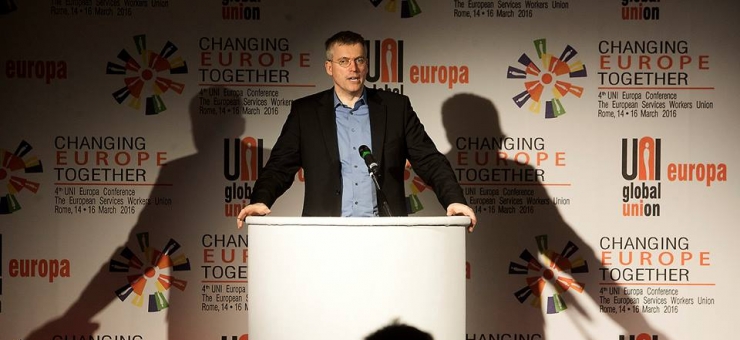UNI Europa Regional Secretary: Vision 2036

UNI Europa Regional Secretary Oliver Roethig’s keynote address to the Congress was preceded by a chilling dystopian vision of a world without unions and workers’ rights in 2036.
Roethig urged union leaders gathered in Rome and their members to ensure this nightmare did not become a full blown reality.
Roethig said, “Already, in 2016, the steady erosion has begun of our fundamental rights: collective bargaining, freedom of association, the right to strike, the right to safe work. All this under the banner of “enhancing competitiveness” and “combatting the crisis.
“Multinational companies are becoming unrestrained by national regulation, regime shopping and playing countries one against the other in a spiralling race to the bottom.
“We are not far from the vision of the neoliberals in Europe: the dismantling of Social European, such that the European Union is reduced to just another free-trade zone, without protection for workers or a real social dimension.”
Roethig then spelt out the two main causes of the ongoing crisis which has now gone on for more than seven years.
“First, one reason this crisis has not gone away is that permanent economic crisis benefits those who wish to see the European trade union movement weakened, and the fundamental European social agreement hollowed out.
“Second, austerity and inequality have encouraged demagogues and opportunists on the right who want to erode trust in our bedrock value of common welfare. In doing so, they are providing political cover for cynical attacks on the European social model.
“The European Commission and some national governments have taken advantage of the crisis to embark on an anti-union campaign, designed to rob us of our strength and force us to fight for our very existence.”
Roethig said UNI Europa was at centre of this struggle because our services sectors, comprise 70% of all workers and it was up to us to hold the line.
“None of us – as individuals or national unions – can stop them alone. Trade unions across borders and sectors must stand together in opposition, with resolve and solidarity. If we do not, the 21st century for workers will more closely resemble Oliver Twist’s nightmare of the 19th.”
He then addressed some of UNI Europa’s key successes since the last regional conference in Toulouse 2011. Namely:
- A mentoring programme for young women, preparing them for leadership roles, supported by 40 for 40 campaign
- Influencing EU policy-making via UNI Europa initiated Better Regulation Watchdog
- 18 trade union alliances linked to multinationals over the last four years
- Successful organising campaigns in Central Europe and Turkey
- Pioneered a forum bringing together 13 social dialogues to develop joint way forward for service sectors
- Enhanced communications visibility, for example, poster campaign at Brussels’ metros mocking hairdressing social partner agreement
- Closer coordination with European trade union federations and ETUC, joint projects, including precarious work and EU youth guarantee scheme
Roethig said that past and future successes depended on close integration with UNI Global Union, “Stronger together in Europe, stronger together with the entire UNI family worldwide.”
He went on to detail the three main themes of the Conference, namely:
- Growing bargaining power – working to improve the living and working conditions of our members and their families
- Growing unions – social and economically Europe cannot succeed without unions. New innovative organising projects in Eastern Europe
- Growing quality jobs – launched Services Manifesto two years ago. Oppose the creation of a digital underclass – precarious work, less income, security and social protection
Roethig concluded that the dystopian vision shown at the start of his address could be avoided if we work to change Europe together with strong unions and a social Europe.
“We will continue changing the future to the benefit of workers and their families. We work for a better future for everyone, not only for the 1%! We will change Europe Together.”
Finally Roethig introduced an alternative positive vision of the future if we achieve all our goals by 2036.

